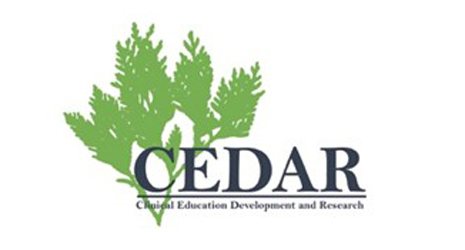| UCAS code | 1234 |
|---|---|
| Duration | 1 year full time |
| Entry year | 2023 (January start) |
| Campus | Streatham Campus |
| Discipline | Psychology |
| Contact |
| Typical offer | There are two separate training routes/qualifications for the course – one at postgraduate and at graduate level. |
|---|---|
Overview
- Develop your career as a Wellbeing Practitioner
- Develop your clinical competency in the low intensity cognitive behavioural therapy clinical method
- Gain an understanding of ways to adapt your practice to accommodate diversity and increase access to evidence-based psychological therapies
- This programme will provide you with an outstanding opportunity to develop the competencies and knowledge associated with practice as a Wellbeing Practitioner for Children and Young People (CYP)
- A strong emphasis throughout the programme is placed upon your personal and professional development
Clinical Education Development and Research (CEDAR)

This programme is delivered by Clinical Education, Development and Research (CEDAR): an applied psychological practice centre of excellence, focussed on training the new psychological therapies workforce of the future.
![]()
Competency-based training, delivered according to the latest evidence-informed clinical pedagogic approaches
![]()
Dedicated training facilities equipped with video and audio recording
![]()
A strong emphasis throughout the programme is placed upon your personal and professional development
Entry requirements
There are two separate training routes/qualifications for the course – one at postgraduate and at graduate level.
For those with no prior degree, on completion the student will be awarded an undergraduate diploma whereas those already with an undergraduate will qualify for a postgraduate diploma.
For postgraduate (PGCert, PGDip, MSc = level 7) applicants would normally be required to have an honours degree (ie studied at level 6 in the national curriculum). A Grad Diploma programme is a level 6 qualification so we would normally expect an applicant to have some evidence of activity at level 5 (e.g. second year UG study or equivalent)
Detail on the minimum of level 5 qualification for undergraduate pathways
Applicants without a degree
This programme is offered at both postgraduate level (PGDip) and at final year undergraduate degree level (GradDip). If you do not hold an undergraduate degree you may be eligible for enrolment on the GradDip programme. The topics you will study are the same for both programmes. Please contact the administrative team for more information.
Entry requirements for international students
Please visit our entry requirements section for equivalencies from your country and further information on English language requirements.
Course content
The aims of the PGDip Psychological Therapies Practice (Low Intensity Cognitive Behavioural Therapy for Children, Young People and Families) are to:
- Provide you with a thorough grounding in the Department of Health Wellbeing Practitioner for Children and Young People (WP-CYP) curriculum working within the Improving Access to Psychological Therapies Programme.
- Develop your understanding and clinical competency in the low intensity CBT clinical method and enable you to adapt your practice to work effectively with children and young people (CYP), their parents/carers and professionals with diverse needs.
- Provide you with the foundations to establish a commitment to continuing professional development and becoming an evidence-based practitioner.
- Provide you with a high quality and stimulating learning experience in a supportive environment that is enriched by an internationally-recognised research environment, nationally-recognised innovative clinical teaching approaches and current clinical practice.
Teaching will begin with trainees spending five days per week at the University as part of the intensive teaching block. It will then taper down to four days per week, then three days per week, before working in service full time for the remainder of the training year.
How to apply
In order to apply for this programme you will need to be selected for a Trainee Children’s Wellbeing Practitioner job role with one of our NHS/voluntary sector partner services, where you will be employed to train at the university while working within the service. Please see the SW CYP IAPT website for a full list of services.
Jobs will be advertised on the NHS jobs website and on individual partner websites, as well as on our SW CYP IAPT website. Please note it is not possible to apply directly to the University of Exeter as you are required to be working within a clinical service in order to participate in the course.
Fees
This course is funded by Health Education England, so fees are not payable by candidates. You will be employed and paid by your service on a minimum 12-month contract, and will split your time between working clinically at your service and studying at the university.
Scholarships
We invest heavily in scholarships for talented prospective Masters students. This includes over £5 million in scholarships for international students, such as our Global Excellence Scholarships*.
For more information on scholarships, please visit our scholarships and bursaries page.
*Selected programmes only. Please see the Terms and Conditions for each scheme for further details.
Teaching and research
Teaching includes:
- Taught sessions
- Individual learning days
- Roleplays
- SPSR (Self-Practice/Self-Reflection activities)
Assessments include:
- a recorded presentation
- a written exam
- formative PPD (Professional Practice Document)
- recordings
- reflective commentaries
- and practice outcomes document/Portfolio
- clinical report writing
Careers
This programme will provide you with an outstanding opportunity to develop your competencies and knowledge as a children’s wellbeing practitioner.
A strong emphasis throughout the programme is placed upon your personal and professional development.
Advantages of the programme are that:
- You will study within a vibrant, stimulating and internationally-recognised research environment, where members of your teaching team have first-hand experience within the clinical setting.
- Your learning experience will be enriched by nationally-recognised, innovative, clinical teaching approaches, designed to develop you on your terms.











